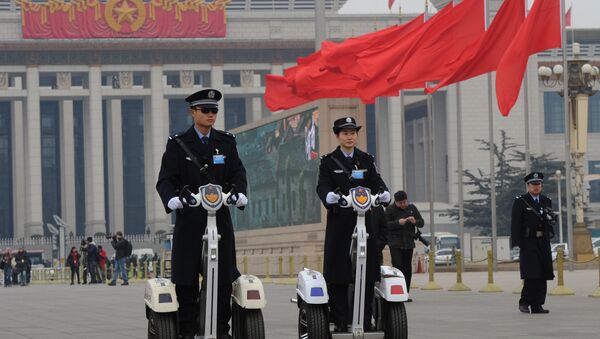Data on where people go, who they see, what they look at online, at home and at work, any financial transactions they make and their hobbies will be analyzed and used by the government to spot any irregular behavioral patterns and identify potential terrorists or protest.
China Is About to Get Even Better at Predicting Dissent https://t.co/sOvMFnLu57 by @DefTechPat pic.twitter.com/CmC03Kx1B7
— Defense One (@DefenseOne) March 8, 2016
According to a Defense One report:
"Beijing is building software to predict instability before it arises, based on volumes of data mined from Chinese citizens about their jobs, pastimes and habits."
The technology known as "predictive policing" has been developed by the United States and will feed into existing research in China into artificial intelligence technologies used to identify people on surveillance cameras.
"Predictive policing" alerts police and military units before a crime takes place so that soldiers and officers can be deployed ahead of the crime, or act, including a political protest occurring.
Wu Manqing, chief engineer at China Electronics Technology Group, responsible for developing the software told reporters in December 2015: "We don't call it a big data platform, but a united information environment… It's very crucial to examine the cause after an act of terror, but what is more important is to predict the upcoming activities."
In the same month, China passed new surveillance laws forcing technology companies operating in China to help the government snoop on its citizens.
The law states that companies "shall provide technical interfaces, decryption and other technical support and assistance to public security and state security agencies when they are following the law to avert and investigate terrorist activities."
China is expected to lead the field, having invested its surveillance capabilities in all its major cities, giving the system plenty of "precrime" and "thoughtcrime" data on its citizens to work with.
However, it's not without irony that China will be using the US-built software to enhance surveillance on its citizens with the assistance of tech companies operating in the country as the US Justice Department has — so far — failed to force Silicon Valley tech giant Apple to hack into one of its iPhones for them.
#SiliconValley giants rally behind #Apple, file brief in California court https://t.co/2QbEwZUgGg #Microsoft #Google pic.twitter.com/WwDTJkT5ek
— Sputnik UK (@SputnikNewsUK) March 4, 2016
The US Justice Department is trying to make Apple build technology that will enable it to break into a cell phone belonging to Syed Farook, who shot dead 14 people in San Bernardino, in what the US President declared "an act of terrorism." Apple has refused to help the FBI.




